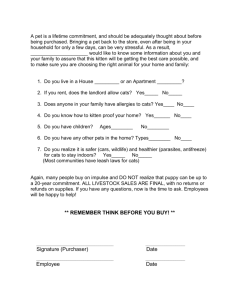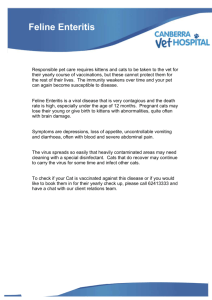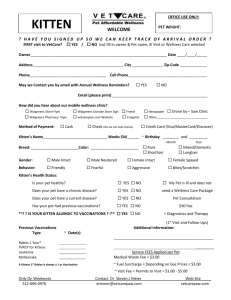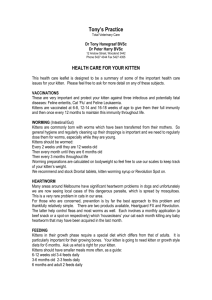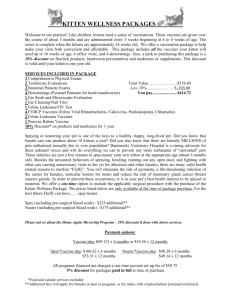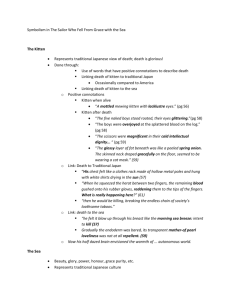CARING FOR YOUR KITTEN
advertisement
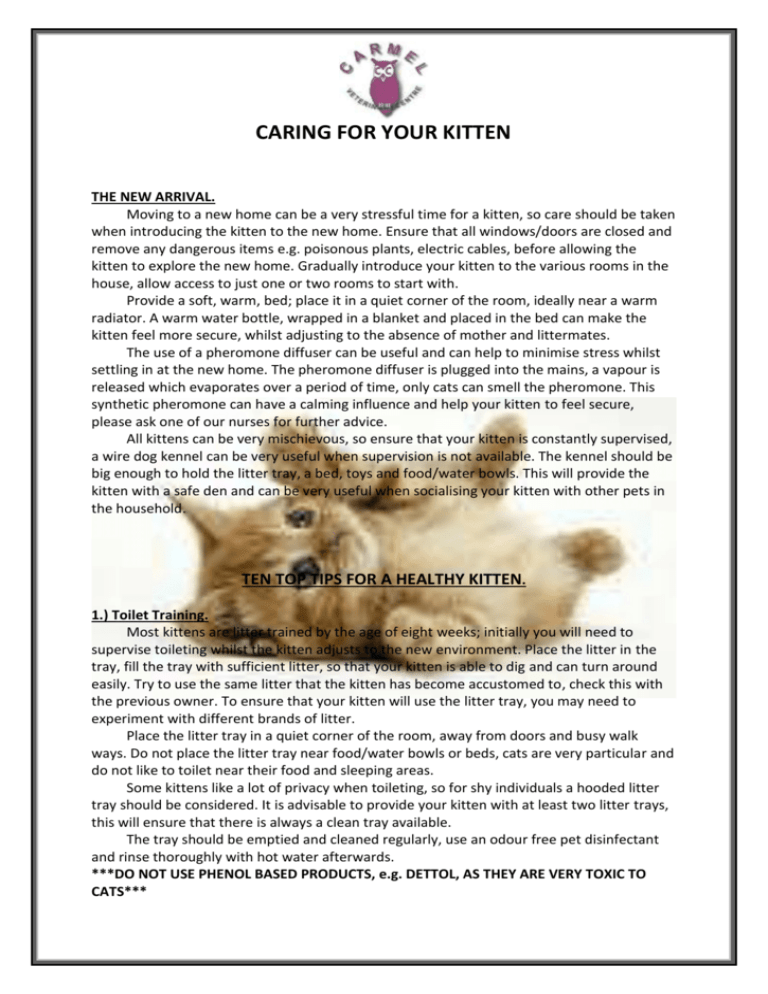
CARING FOR YOUR KITTEN THE NEW ARRIVAL. Moving to a new home can be a very stressful time for a kitten, so care should be taken when introducing the kitten to the new home. Ensure that all windows/doors are closed and remove any dangerous items e.g. poisonous plants, electric cables, before allowing the kitten to explore the new home. Gradually introduce your kitten to the various rooms in the house, allow access to just one or two rooms to start with. Provide a soft, warm, bed; place it in a quiet corner of the room, ideally near a warm radiator. A warm water bottle, wrapped in a blanket and placed in the bed can make the kitten feel more secure, whilst adjusting to the absence of mother and littermates. The use of a pheromone diffuser can be useful and can help to minimise stress whilst settling in at the new home. The pheromone diffuser is plugged into the mains, a vapour is released which evaporates over a period of time, only cats can smell the pheromone. This synthetic pheromone can have a calming influence and help your kitten to feel secure, please ask one of our nurses for further advice. All kittens can be very mischievous, so ensure that your kitten is constantly supervised, a wire dog kennel can be very useful when supervision is not available. The kennel should be big enough to hold the litter tray, a bed, toys and food/water bowls. This will provide the kitten with a safe den and can be very useful when socialising your kitten with other pets in the household. TEN TOP TIPS FOR A HEALTHY KITTEN. 1.) Toilet Training. Most kittens are litter trained by the age of eight weeks; initially you will need to supervise toileting whilst the kitten adjusts to the new environment. Place the litter in the tray, fill the tray with sufficient litter, so that your kitten is able to dig and can turn around easily. Try to use the same litter that the kitten has become accustomed to, check this with the previous owner. To ensure that your kitten will use the litter tray, you may need to experiment with different brands of litter. Place the litter tray in a quiet corner of the room, away from doors and busy walk ways. Do not place the litter tray near food/water bowls or beds, cats are very particular and do not like to toilet near their food and sleeping areas. Some kittens like a lot of privacy when toileting, so for shy individuals a hooded litter tray should be considered. It is advisable to provide your kitten with at least two litter trays, this will ensure that there is always a clean tray available. The tray should be emptied and cleaned regularly, use an odour free pet disinfectant and rinse thoroughly with hot water afterwards. ***DO NOT USE PHENOL BASED PRODUCTS, e.g. DETTOL, AS THEY ARE VERY TOXIC TO CATS*** If the kitten is reluctant to use the tray it could be because: It is too dirty. It is not big enough. You have cleaned it with a strong scented chemical. Insufficient amount of litter. The kitten does not like the litter. It is located in an area that is too noisy. It is positioned too near to the bed or food bowls. 2.) Vaccination. There are various infectious diseases that kittens can contract, including flu, enteritis and leukaemia. Feline enteritis and cat flu are both very debilitating diseases and can make kittens and adult cats seriously ill, in rare cases these diseases can be fatal. The feline leukaemia virus is a disease that attacks the immune system, when contracted 50% of cats will die within six months of diagnosis and 80% within three years. Kittens can be vaccinated against these awful diseases, an initial course of two injections are given, one injection at nine weeks of age and a second injection at twelve weeks of age. ***REMEMBER IMMUNITY WILL NOT LAST FOR THE DURATION OF YOUR PET’S LIFE, ANNUAL BOOSTER VACCINATIONS ARE REQUIRED TO ENSURE CONSTANT PROTECTION*** 3.) Worming. All kittens are born with worms, it is essential that you have an effective worming regime for your kitten. There are two main types of worm “roundworm” and “tapeworm”, both of these can cause vomiting, diarrhoea, poor health and anaemia. Kittens should be wormed every two weeks until the age of twelve weeks, monthly until six months of age and then every three months thereafter. There are a variety of worming preparations, including, liquids, tablets and spot-on treatments. Please ask one of our nurses for advice on the most suitable product for your kitten. 4.) Fleas. Fleas are a very common problem, they cause skin irritations, can transmit tapeworm and in severe cases can cause anaemia. It is good practice to treat your pet on a regular basis, usually every month, even if you have not seen any fleas on your pet, prevention is better than cure. If left untreated fleas will breed very rapidly, one flea can lay two hundred eggs, so a single flea can soon lead to a major infestation in your home. There are several different types of flea treatment, spot-on treatments seem to be the easiest to apply, please ask one of our nurses for advice. *** NEVER USE PRODUCTS THAT ARE FORMULATED FOR DOGS, THEY ARE TOXIC AND CAN KILL CATS*** 5.) Identification. Microchipping is a permanent method of identifying your kitten. The procedure is simple and can be performed during a consultation; it involves injecting a tiny microchip under the skin. The microchip has as code which is unique to your pet this code is registered on a computer database along with your address and telephone numbers. If your pet goes missing, a scanner can be used to read the chip and the microchip company can be contacted so that you and your pet can be reunited promptly. If you decide to use a collar with an identification tag, ensure that it is a reflective, safety collar, kittens are very inquisitive and can easily get caught on a branch or a fence. Ensure that the collar is fitted correctly, you should be able to get one finger underneath the collar. ***REMEMBER TO ADJUST THE COLLAR AS YOUR KITTEN GROWS*** 6.) Neutering. There are many unwanted cats and kittens, both male and female cats should be neutered. It is sensible to have your pet neutered at an early age, usually between five and six months of age. Male cats that are not neutered are at risk of developing many undesirable behavioural changes. He will become territorial and mark his territory by spraying his urine, in and out of the home. Roaming for territory will mean that he will travel further afield and may be involved in a road traffic accident. Fighting for territory can prove to be hazardous resulting in wounds and abscesses. Cat bites can transmit life threatening viruses, in particular F.I.V (Feline Immunodeficiency Virus, otherwise known as Cat Aids) or F.E.L.V (Feline Leukaemia Virus). Female cats that are not neutered are at risk of ovarian/vaginal cancer, womb infections, mammary tumours, seasons, false pregnancy and unwanted pregnancy. A female cat can produce hundreds of unwanted kittens in a lifetime. Research has shown that neutered pets live for two years longer than pets that have not been neutered, so book your kitten’s operation now. 7.) Feeding. It is essential that your kitten is provided with a good quality, complete kitten food to ensure adequate growth and bone development. Never feed an adult food to a kitten as it does not contain the correct nutrients for your kitten and can cause diarrhoea. Most cats and kittens prefer to eat little and often throughout the day, if you prefer to feed set meals, your kitten should be given four meals per day. Tinned food can become rancid if left out for a while, by feeding a dry diet the food can be left in a bowl for the kitten to eat at its leisure. Many cats can suffer with cystitis and bladder stones, to help prevent bladder problems it is important to provide plenty of water for your pet. Cat bowls are usually too small for providing sufficient water, so use a large dog bowl or several small bowls. Cats and kittens enjoy drinking fresh water, pet fountains can be purchased which filter the water and encourage your pet to drink. Pet fountains also replenish the water level as your pet drinks it, so there is never any risk of being without water, which is particularly useful during the summer months. 8.) Pet insurance and Health plans. It is important to insure your kitten, many illnesses can cost hundreds of pounds to treat and it can cost thousands if your pet needs to be referred to a specialist. Pet insurance will ensure that your vet bills will never be more than the cost of your excess. There are several pet insurance companies, always ensure that your chosen insurance company will cover any illness for the duration of your pet’s life. If you require any advice about pet insurance, please discuss it with one of our nurses. As a practice we predominantly deal with one of the biggest pet insurance companies and all members of staff are trained in their policies. *** ALWAYS READ INSURANCE POLICIES CAREFULLY, INCLUDING THE SMALL PRINT*** As well as pet insurance we have our own health plan which is designed to enable you to budget for routine treatment e.g. booster vaccination, flea treatment. The benefits include: Two clinical examinations per year with a Veterinary Surgeon. Booster vaccination. Flea treatment (sufficient for one year) Worming treatment (sufficient for one year) 10% discount off Purina pet food and merchandise 20% discount off all services. 9.) Grooming and tooth care. Most cats spend at least an hour each day grooming their coat, all cats need a little assistance with their grooming, even short haired cats should be groomed regularly. It is very important to accustom your kitten to being brushed, especially important if you have a long haired kitten. It is vital that the correct equipment is used:SHORT HAIR – Use a fine comb, a soft brush and a rubber brush (designed to remove loose undercoat). LONG HAIR – Use a wire brush, a wide tooth comb, a fine comb and slicker brush. Finish with a little grooming powder, it is useful as it separates the fur and removes dirt, baby powder works equally as well but ensure that it is hypoallergenic. If you do not groom your cat regularly, it may cause poor skin condition, hairballs and the coat can tangle into painful knots. Remember to check your kitten’s teeth on a regular basis, dental disease is one of the most common problems treated at a veterinary practice. Most cats and dogs have got some form of dental disease by the time they reach two years of age. To prevent dental problems from developing get your kitten accustomed to tooth brushing, feed a dry diet and see a nurse for regular dental assessments. 10.) Toys and scratching posts. Kittens are full of mischief and have endless energy, to encourage normal behaviour give your kitten a variety of toys to play with. It is not necessary to purchase expensive toys, a screwed up piece of paper and a cardboard box will entertain your kitten for hours. Ensure that you have play sessions with your kitten every day, always end a play session if your kitten becomes aggressive or out of control as this behaviour should not be encouraged. In the wild, cats scratch trees to remove the outer shell from their claws, to leave their scent and mark their territory. Domestic cats need to perform this natural behaviour too, so provide your kitten with a scratching post. Remember to provide a larger scratching post as your kitten grows. Kittens are very inquisitive and will play with things that they should not play with. Always ensure kittens are kept away from hot cookers, cooking pots, hot water, electric cables, rat poison, garden chemicals and household cleaning products. Certain plants and flowers can be poisonous too, if you are unsure if a plant is toxic, contact a veterinary nurse or a garden centre. Long grasses can be very entertaining to a kitten but be careful as blades of grass can become lodged down the throat. *** LILIES ARE VERY POISONOUS TO KITTENS AND CATS, INGESTION OF POLLEN CAN BE LIFE THREATENING. SEEK URGENT VETERINARY ADVICE IF YOUR PET HAS COME INTO CONTACT WITH LILIES*** CARMEL VETERINARY CENTRE (01902) 731127
